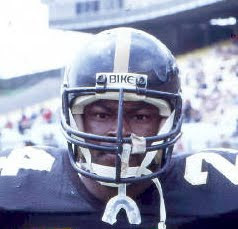
As the Denver Gold hosted the Los Angeles Express on May 22, 1983, they not only were in the midst of a four-game losing streak but were under the direction of an interim head coach, Charley Armey. Owner Ron Blanding, concerned that the team was on the verge of falling out of the running in the Pacific Division, had dismissed Head Coach Red Miller (pictured) following the previous week’s 17-9 loss to the Boston Breakers. Miller thus became the first USFL head coach to be fired.
However, the move was not a popular one with Denver football fans. Miller had coached the NFL’s Broncos to their first Super Bowl appearance in 1977 and was thus held in great esteem. He had compiled a 42-25 record in four seasons with the Broncos, easily the best up to that time in the club’s history. For Blanding to hire him to coach the Denver USFL franchise was great for public relations – firing him was not. Moreover, even though the Gold was a mediocre 4-7, they were only a game out of first place in a weak division.
The Express, 5-6 and tied for first with Oakland, had lost three of their last four contests. The teams may have been far from the cream of the crop in the league, but were in the running for the postseason, thus making this a key division matchup.
At halftime Denver held a 7-0 lead thanks to a 31-yard touchdown pass play from QB Alvin White to RB Harry Sydney. LA tied the score in the third quarter as QB Mike Rae connected with RB John Barnett for a 19-yard TD. Brian Speelman moved the Gold back in front later in the period with a 50-yard field goal, but the Express won in the fourth quarter as Barnett dove into the end zone from a yard out with 3:32 left to play. Los Angeles went home the winner by a 14-10 margin.
The lackluster effort by the Gold was reflected in the statistics. The Express led in time of possession (34:28 to 24:32), first downs (22 to 10), and yards from scrimmage (373 to 185). There was no dominant runner for LA - RB Wilbert Haslip led the club with 36 yards on 8 carries while John Barnett, with the two TDs, contributed 33 yards on 9 attempts and RB LaRue Harrington added 30 yards on 12 rushes. Mike Rae, formerly of Toronto in the CFL and a backup with Oakland and Tampa Bay in the NFL, completed 21 of 43 passes for 275 yards with the one TD and two interceptions. WR Anthony Allen led the receivers with 5 catches for 68 yards.

As he did all season, RB Harry Sydney (pictured at left) led Denver in rushing with 46 yards on 13 carries and added another 44 yards on three pass receptions, including the team’s lone touchdown. Alvin White saw his only action of the year at quarterback, completing 2 of 7 passes for 38 yards with two interceptions and the one TD. QB Ken Mortensen completed 9 of 15 throws for 109 yards with no touchdowns and none picked off. Along with Sydney, two other receivers had three catches apiece (TE Bob Niziolek and WR Johnnie Dirden), with Dirden accumulating the most yards with 54.
Owner Blanding sought to mollify the loyal Denver fans (the team led the USFL in attendance in 1983, averaging 41,736 per game). He hired Craig Morton, quarterback of the 1977 AFC Championship team, as head coach in the week following the loss to the Express. The Gold won their first two contests with Morton at the helm, but ultimately ended up in third place with a 7-11 record. Los Angeles also missed out on winning the league’s weakest division, finishing second at 8-10.
Denver had sought to remain competitive while adhering closely to the original USFL philosophy of eschewing high-priced players in order to control costs. The defensive unit was respectable, but the offense lacked firepower – the Gold had the lowest-rated passing offense. Harry Sydney was one of the few notable offensive performers, rushing for 801 yards on 176 carries (4.6 average) with 9 touchdowns and catching 31 passes for 306 yards and another two scores. Bob Niziolek also performed well, catching 37 passes for 373 yards and three TDs. But the quarterbacks combined for just 4.6 yards per pass attempt with 36 interceptions against 19 touchdowns.